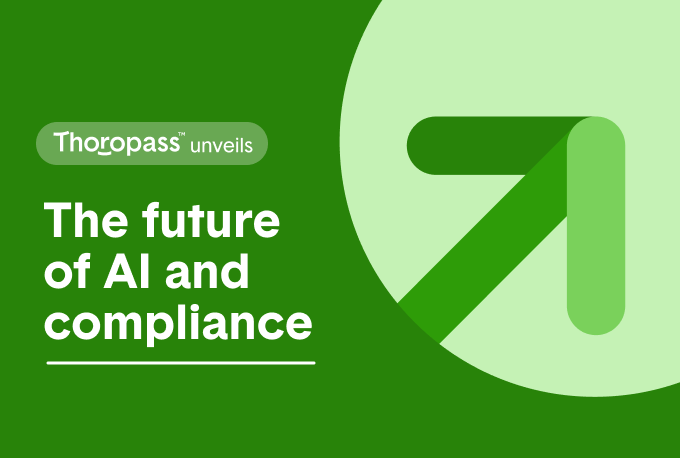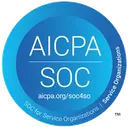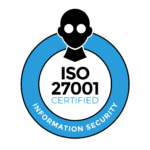As more industries worldwide adopt more sustainable practices, ISO 42001 training is becoming crucial for businesses seeking to build and integrate artificial intelligence (AI) responsibly.
In particular, fintech, health tech, and SaaS companies should stay compliant while leveraging cutting-edge technologies like AI. Understanding ISO 42001 and how to align it with your AI management systems can help your business gain a competitive edge and mitigate risks.
In this post, we’ll break down what ISO 42001 training entails, why it’s essential, and how it prepares your organization and team to use AI successfully.
Key takeaways
- ISO 42001 training provides two distinct courses that offer essential skills for Lead Implementer and Lead Auditor roles, ensuring ethical and responsible AI use within organizations. This post focuses more on implementer training.
- Participants in such training gain a comprehensive understanding of AI management, covering both theoretical principles and practical applications, including risk assessment and governance frameworks.
- These courses are designed for a wide range of professionals and are available in various formats (e.g., a self-paced learning course), making them accessible and flexible to meet diverse learning needs.
What is ISO 42001 training?
ISO 42001 is an international standard designed to help organizations implement effective AI management systems to improve their AI environmental performance. ISO 42001 training provides employees with the knowledge and skills they need to implement and maintain AI systems that comply with regulatory requirements.
Whether you’re working in fintech, health tech, or SaaS, understanding how to integrate this standard into your operations is key to maintaining regulatory compliance. Training programs cover everything from the fundamentals of the specific management system standard to measuring and improving environmental outcomes.
ISO 42001 Lead Implementer Training
- Objective: This training prepares individuals to design, implement, and manage an ISO 42001-compliant AI Management System (AIMS) within their organization
- Focus:
- Understanding ISO 42001 requirements for responsible AI
- Developing policies and procedures to ensure compliance and ethical AI usage
- Implementing risk management strategies for AI deployment
- Monitoring and improving AI environmental performance
- Audience: Designed for AI specialists, compliance officers, project managers, and anyone tasked with embedding ISO 42001 standards into organizational workflows
- Outcome: Participants are equipped to create and maintain a framework for ethical, sustainable AI practices, ensuring compliance with ISO 42001
ISO 42001 Lead Auditor Training
- Objective: This training focuses on equipping individuals to audit and evaluate an organization’s compliance with ISO 42001 for AIMS
- Focus:
- Auditing principles, techniques, and methodologies
- Planning and conducting both internal and external audits
- Assessing the effectiveness of AI risk management, compliance, and performance monitoring systems
- Identifying gaps and recommending corrective actions
- Audience: Targeted towards internal auditors, certification professionals, and external assessors who evaluate organizational adherence to ISO 42001
- Outcome: Participants become qualified to assess and report on the effectiveness of AIMS, ensuring organizations meet and maintain ISO 42001 standards
This post focuses more on implementer training.
Why businesses need ISO 42001 implementer training
ISO/IEC 42001 training isn’t just about obtaining certification—it’s about embracing a fundamental shift in how your organization embraces artificial intelligence. It signals clearly that your organization takes responsibility for implementing AI safely.
The standard represents a comprehensive way of conducting business, emphasizing ethical AI development and sustainable practices. Achieving and maintaining this compliance requires the buy-in of every team member involved in the technology or influencing strategic decisions.
Informed, engaged teams are crucial in embedding ISO 42001 principles into the fabric of the organization. Without active participation from all relevant departments, businesses risk failing to meet the standard’s compliance and ethical benchmarks.
Here are the fundamental principles guiding ISO 42001 and why they matter to businesses:
AI risk assessment
One of the critical elements of ISO 42001 is conducting a thorough AI risk assessment to identify and mitigate potential risks associated with AI technology. This process goes beyond a simple review of algorithms. It requires organizations to assess the integrity of data sources, training environments, and operational contexts where the artificial intelligence systems will function.
A well-rounded AI risk assessment helps prevent issues such as misaligned data, algorithmic biases, and unfair decision-making. These risks could otherwise distort outcomes and disproportionately impact marginalized groups, especially in hiring, lending, or healthcare sectors.
By ensuring a robust risk assessment process, businesses can implement responsible AI practices and establish safeguards to protect their stakeholders, including customers, employees, and communities.
Ethical principles
At the core of ISO 42001 are ethical principles that guide the development and deployment of AI systems. These principles ensure that businesses are building and utilizing artificial intelligence in ways that promote fairness, transparency, accountability, and respect for human rights.
- Fairness: Organizations must ensure that their AI models do not perpetuate biases, especially those that could lead to discriminatory outcomes.
- Transparency: Making AI decision-making processes understandable and explainable to both users and stakeholders is essential.
- Accountability: Businesses must take responsibility for the actions and impacts of their AI systems, addressing any unintended consequences.
- Respect for human rights: AI systems should align with societal values, reducing the risk of harm and contributing positively to human well-being.
These ethical guidelines are not just about regulatory compliance—they are fundamental to building trust with the public and maintaining long-term credibility in the marketplace.
Continual improvement of AI systems
A hallmark of ISO 42001 is its emphasis on continual improvement. AI systems are not static, nor should the processes managing them be. Technology evolves, and new challenges—such as sophisticated cyber threats or regulatory shifts—emerge regularly.
Organizations must continually review and refine their artificial intelligence management system to stay ahead. Continual improvement involves creating feedback loops where AI performance is monitored, recalibrated, and improved over time. Regular updates to algorithms, training data, and risk management protocols ensure systems remain aligned with ethical standards and business objectives.
This cycle of continual improvement fosters innovation and positions businesses to capitalize on the latest advancements in AI, all while managing risks proactively.
AI system lifecycle
ISO 42001 takes a lifecycle approach to managing AI, emphasizing the importance of overseeing AI systems from conception to retirement. This lifecycle management includes:
- Development: Ensuring that data and algorithms are ethically sourced and free from bias.
- Operation: Ongoing real-time monitoring to detect performance issues or emerging risks.
- Decommissioning: Safely retiring AI systems while protecting data privacy and ensuring smooth transitions to newer technologies.
By considering the entire AI lifecycle, businesses can ensure long-term accountability and prevent the risks associated with obsolete or poorly managed systems.
ISO 42001 training empowers businesses to adopt a proactive approach to environmental and AI governance, where compliance is integrated into everyday operations rather than just ‘checked off’ a list.
Bringing these principles to bear on day-to-day operations requires extensive training and buy-in at every level of your organization. This helps to ensure that artificial intelligence is developed with the right mindset and that the organization’s environmental and technological practices align with its long-term goals.
What does ISO 42001 implementer training typically cover?
ISO 42001 training is usually comprehensive, providing participants with both theoretical knowledge and practical tools to implement environmental management standards.
Participants can expect the training to cover several key areas that will equip them to navigate the complexities of implementing an artificial intelligence management system (AIMS). Here’s what a typical ISO 42001 curriculum might include:
1. History and development of ISO 42001
Understanding the origins and development of ISO/IEC 42001 provides context for its implementation. The training will often delve into the motivations behind the creation of the standard, focusing on how increasing concerns around the ethical use of AI spurred the need for comprehensive management guidelines.
Participants will learn how the standard was designed to address gaps in existing regulations and how it has evolved to keep pace with advances in AI technology.
2. Key concepts, principles, structure, and benefits
ISO 42001 training also usually covers the standard’s foundational key concepts, principles, and structure. This section provides participants with the vocabulary and framework necessary to implement and operate an AIMS effectively. Understanding the structure of ISO 42001 enables businesses to integrate its requirements seamlessly into their broader operational and compliance strategies.
Training participants will also explore the advantages of implementing an artificial intelligence management system. The benefits include:
- Gaining a competitive edge by demonstrating that the organization adheres to best practices for AI governance
- Establishing credibility and trust with customers, regulators, and stakeholders by aligning with ethical AI principles
- Fostering innovation while ensuring AI systems remain compliant and free from harmful biases
- Enabling businesses to continually improve their AI systems, ensuring long-term success and sustainability
3. What are artificial intelligence management systems (AIMS)?
A core element of ISO 42001 training is understanding what an AI management system (AIMS) entails.
Participants will learn that an AIMS is a structured framework for managing the lifecycle of AI systems, from development to deployment and beyond. It covers essential processes for ensuring that artificial intelligence systems operate ethically, transparently, and safely. The training will cover how AIMS sets a foundation for businesses to maintain accountability, avoid risks, and ensure regulatory compliance when working with AI.
4. AIMS vs. other management system requirements
Participants will also explore the specific management system standards outlined in ISO 42001 and compare them with other standards, such as ISO 9001 (quality management) and ISO 27001 (information security).
The training will likely highlight how ISO/IEC 42001 introduces additional layers of governance tailored to AI, particularly in areas like transparency, fairness, and ethical considerations. Understanding these distinctions helps organizations meet the unique demands of AI governance while integrating AI management into their broader compliance framework.
5. Identifying and mitigating AI risks
When not properly managed, AI systems can present significant risks, such as bias, data privacy concerns, and unintended consequences.
Training participants will gain an in-depth understanding of how to mitigate risks related to AI by conducting comprehensive risk assessments and implementing safeguards throughout the AI lifecycle. By identifying potential pitfalls early on, organizations can avoid costly errors and protect their stakeholders.
Courses usually highlight the importance of continuous monitoring and improvement, ensuring AI systems remain compliant and aligned with ethical standards as they evolve.
6. Ensuring trustworthy, transparent, and accountable AI
ISO 42001 places significant emphasis on the trustworthiness, transparency, and accountability of AI systems. Training will guide participants through the principles that ensure AI operates ethically and aligns with organizational and societal values.
Topics include how to:
- Make AI decision-making processes transparent and understandable
- Ensure systems are fair and do not introduce biases
- Build accountability mechanisms to monitor and address AI’s impact on stakeholders
This fosters a culture of responsible management, helping organizations maintain public trust in their AI technologies.
7. Regulatory compliance and risk management
Another crucial element of ISO 42001 training is learning what actions businesses should take to maintain regulatory compliance. As AI governance becomes increasingly regulated, participants will be taught how to stay ahead of legislative developments and ensure that their artificial intelligence management system adheres to industry standards and legal requirements.
Training will emphasize the need to continuously review and update AI systems to address emerging challenges, such as shifts in management system requirements or new regulations affecting AI technology.
Participants will walk away with a clear understanding of the main requirements of ISO 42001, including how to:
- Define and implement an AI governance framework
- Ensure that AI systems are trustworthy, transparent, and safe
- Monitor and continually improve AI performance and compliance
- Identify the risks associated with AI and take proactive steps to mitigate them
This comprehensive overview equips organizations to implement ISO 42001 effectively, ensuring that their AI systems are not only compliant but also aligned with ethical and responsible management practices.
Explore different training formats
For busy professionals, flexible learning options are essential. Many providers now offer self-paced learning courses that allow you to complete the training on your own schedule. A self-paced course provides the flexibility to:
- Gain basic knowledge of ISO 42001 at your own pace
- Review materials at your convenience
- Fit training into your work schedule without disrupting operations
- Ensure successful completion participants are fully certified and prepared to implement the standard
Choosing a self-paced learning option allows your team to stay compliant without sacrificing productivity.
However, some participants may prefer focused time to deep-dive into these topics, in which case live training (either online or in-person) may be a better option. Such courses usually span a couple of days and allow for a greater degree of participation, networking, and custom learning.
Different people learn in different ways. Allowing your team the flexibility to choose the best training approach for their needs will ensure maximum engagement and retention.
Who should take ISO 42001 training at your organization?
ISO 42001 implementer training is valuable for a wide range of professionals across various industries, particularly those involved in implementing, auditing, maintaining, or supervising an artificial intelligence management system (AIMS).
Whether you are directly responsible for AI technology or play a role in shaping organizational strategy, this training equips you with the knowledge and tools to ensure AI systems are implemented safely, ethically, and in compliance with regulatory standards.
Training is highly recommended for professionals from different departments, as AI governance affects multiple facets of business operations. Specifically, the following individuals would benefit most from ISO 42001 training:
- Senior leaders and executives: CEOs, CTOs, and other senior leaders driving the strategic use of AI in products and services. Their understanding of AI governance and compliance is essential for aligning AI initiatives with ethical standards, risk management practices, and long-term business goals.
- Legal managers: To ensure AI initiatives comply with legal and regulatory requirements.
- Privacy managers: To address data privacy concerns and protect sensitive information within AI systems.
- Operations managers: To oversee the integration of AI into day-to-day business activities while maintaining efficiency and ethical standards.
- Marketing managers: To understand how AI can be leveraged responsibly in customer-facing applications, such as advertising and personalized marketing.
- R&D managers: To ensure AI research and development processes align with responsible practices and compliance requirements.
- Sales managers: To learn how AI can be implemented safely in customer relationship management and sales strategies.
- HR managers: To oversee the use of AI in recruitment, employee management, and performance evaluations while ensuring fairness and transparency.
- IT managers: To manage the technical aspects of AI system deployment and maintenance, ensuring robustness and compliance with the standard.
- Risk managers: To identify and mitigate risks associated with AI systems, ensuring they do not introduce unforeseen liabilities or ethical concerns.
- Trainers and consultants: To guide organizations through the complexities of ISO 42001 implementation and ongoing compliance efforts.
In short, anyone with a stake in how AI technology is integrated into an organization—whether from a technical, legal, or operational standpoint—should consider ISO 42001 training. It provides the foundational knowledge needed to utilize artificial intelligence systems responsibly and maintain ongoing compliance with evolving artificial intelligence management system standards.
Is training recommended if you use compliance software like Thoropass?
Yes, ISO 42001 training is still highly recommended, even if an organization uses compliance software like Thoropass or works with compliance consultants. While these tools and experts can offer guidance and streamline compliance efforts, the training provides internal teams with essential knowledge that complements external support.
Here’s why it’s crucial:
- A deeper understanding of compliance frameworks: Compliance software can help manage and automate processes. However, internal teams benefit from understanding the principles behind ISO 42001 and how they apply to their organization’s AI systems. This foundational knowledge enables more informed decision-making when configuring software or interpreting consultant advice.
- Informed collaboration with consultants: Training empowers employees to collaborate more effectively with consultants. Instead of relying solely on external advice, trained staff can ask the right questions, evaluate recommendations critically, and ensure that any strategies or systems fully align with their business goals.
- Maximizing software tools: Compliance software often comes with customizable features, workflows, or dashboards. By having trained staff who understand ISO 42001, organizations can configure these tools to their full potential, ensuring they address all relevant requirements and are used in a way that aligns with the organization’s specific needs.
In summary, even with compliance software and external consultants, ISO 42001 training helps to ensure that internal teams have the knowledge and skills to maintain compliance effectively and sustainably. It fosters a culture of responsibility and empowers organizations to own their AI governance processes.
Enter the AI era
Explore GenAI for your business, safely and securely
Explore the suite of new offerings from Thoropass to help your organization set itself up for success in this new era of GenAI and compliance

Related Posts
Stay connected
Subscribe to receive new blog articles and updates from Thoropass in your inbox.
Want to join our team?
Help Thoropass ensure that compliance never gets in the way of innovation.

.webp)













.png)